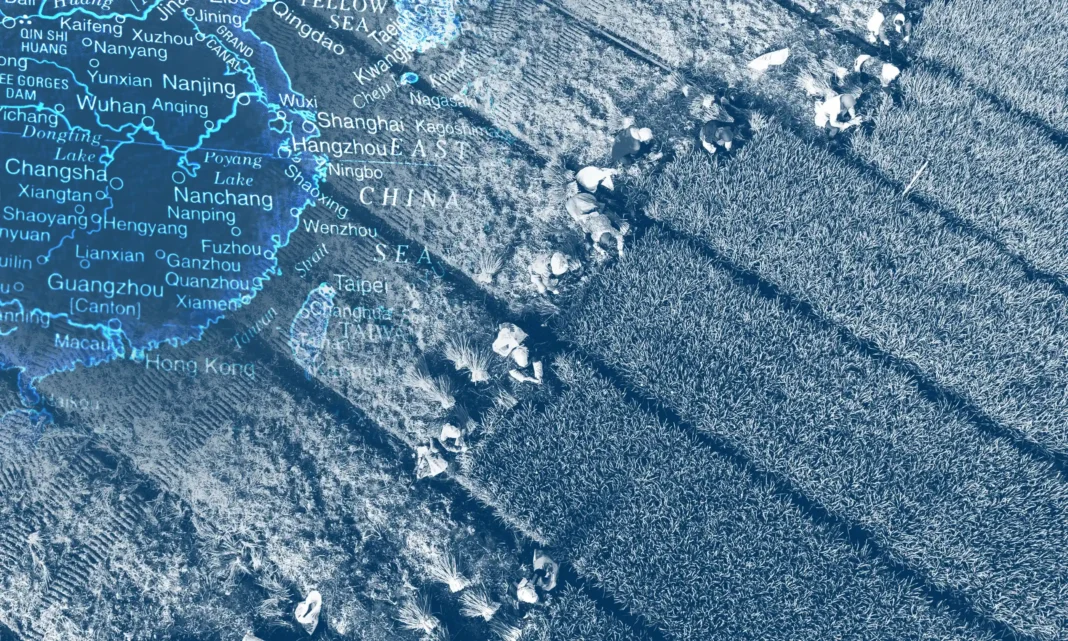Not much could unite Peng Lifa, the activist who disappeared after staging a rare anti-lockdown protest in Beijing last year, and Xi Jinping, the Chinese leader who Peng was criticising. But in October 2022, both men diagnosed the same vulnerability in China: food.
“We want food, not PCR tests,” read Peng’s bright red characters, emblazoned on a banner hung over Beijing’s Sitong Bridge on 13 October. Three days later, Xi gave a speech to the Chinese Communist party (CCP) about how to “hold high the great banner of Socialism with Chinese characteristics”.
“We must reinforce the foundations for food security on all fronts,” China’s president said.
If China’s economy is to withstand a military conflict with Taiwan, and the inevitable sanctions that such an attack would trigger, it needs to ensure a stable supply of energy. That means fuel for the economy, as well as for the citizens who power it.
Ensuring that China’s population has enough food has plagued every leader since the imperial dynasties. The country is home to one-fifth of the world’s population but only 7% of its arable land and as the population has urbanised, diets have shifted and the number of farmers has declined.
That has left China increasingly reliant on imports to fill its 1.4 billion stomachs. If, in the event of a conflict with Taiwan, China enters a wartime economy, then ensuring a stable food supply will be vital for China’s leaders.
Beijing is already trying to reduce its reliance on strategic rivals. Chinese orders for US corn in 2022-2023 are down 70% on the previous year, according to the US department of agriculture.
Instead, China is relying on friendlier countries such as Brazil, which delivered its first vessel of corn to China’s shores in January. Last year China agreed to waive some pest and disease checks in order to expedite the Brazilian imports.
A bigger challenge lies in boosting China’s domestic productivity; excessive fertiliser use has reduced the fertility of large swathes of farmland, meaning that some crops cost twice as much to harvest in China than the US, with significantly lower yields. A lack of genetically modified seeds, which are widely used in the US, adds to the problem.
The government sees genetically modified seeds – dubbed “the chips of agriculture” – as an important piece of the puzzle. A cultural aversion to GM seeds has slowed their adoption, but Beijing is expected to permit the planting of GM corn for the first time in the near future.
“China does not really have robust legislation” around the use of GM crops, said Zoe Zongyuan Liu, a fellow at the Council on Foreign Relations. However, the government is cottoning on to the need to introduce them into the farming system, if China is to boost its self-sufficiency.
Addicted to coal
While many analysts believe – or perhaps hope – that western countries would not weaponise hunger against China in the event of a conflict with Taiwan, the war in Ukraine has shown that energy is highly likely to be hit with sanctions. And unlike Russia, with its vast reserves of natural gas, China is dependent on other countries for much of its energy.
More than 80% of China’s energy comes from coal, oil and gas. Coal makes up the lion’s share of that mix, and most of that is produced domestically. Although China has pledged to reduce its reliance on coal, in the first three months of this year local governments approved more new coal power than in the whole of 2021. Last year, China permitted the equivalent of two new plants a week.
But oil and gas are crucial to the country’s economy, in areas such as transport. Around three-quarters of China’s crude oil is imported, mainly from friendly countries such as Russia and Saudi Arabia. While these countries are unlikely to comply with potential sanctions on Beijing, much of their crude oil is transported via seaborne tankers, which are vulnerable to interception.
A similar risk applies to gas. About 40% of it is imported, but mindful of the risks that come with seaborne deliveries, China has drastically ramped up domestic production and overland pipeline imports. Last year China’s seaborne imports of LNG fell by 20%, compared with 2021 (this fall was also driven by Covid restrictions), while domestic production increased by 6% and pipeline imports by 9%.
“In today’s environment around China, the [interception] of sea imports … would be relatively easy for western, democratic allied countries. They don’t need to do that anywhere near China,” says Paul Dabbar, a visiting fellow at Columbia University’s Center on Global Energy Policy.
Companies would “very quickly stop shipping” if their ships were threatened with seizure by the US authorities, Dabbar said.
Building enough pipelines to fulfil China’s gas demands would be a huge infrastructural challenge. When Xi visited Moscow in March, he and Vladimir Putin signed a number of agreements, but failed to make progress on Power of Siberia 2, a new gas pipeline that would deliver 50bn cubic metres of Russian gas to China via Mongolia.
In the meantime, China remains addicted to coal. Xi has pledged to phase down consumption from 2026, but if a conflict with Taiwan is indeed on the horizon by then, as many US officials expect, coal is likely to remain vital to China’s ambitions.

